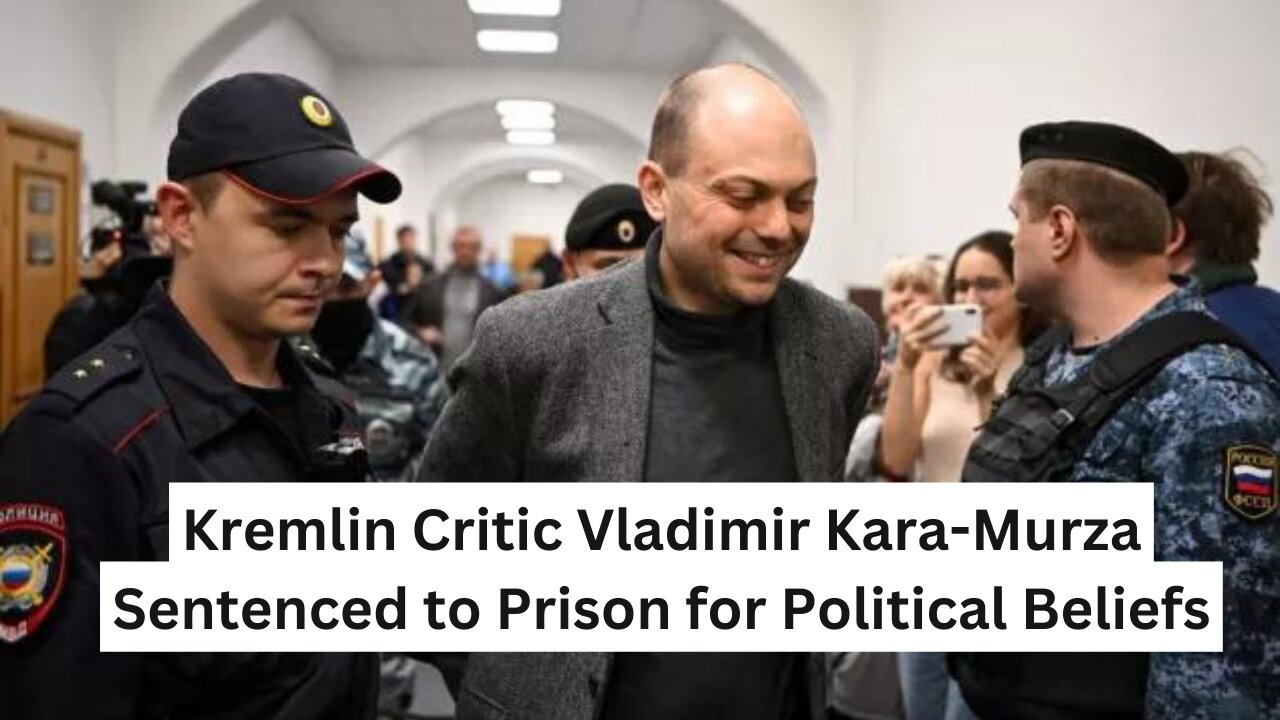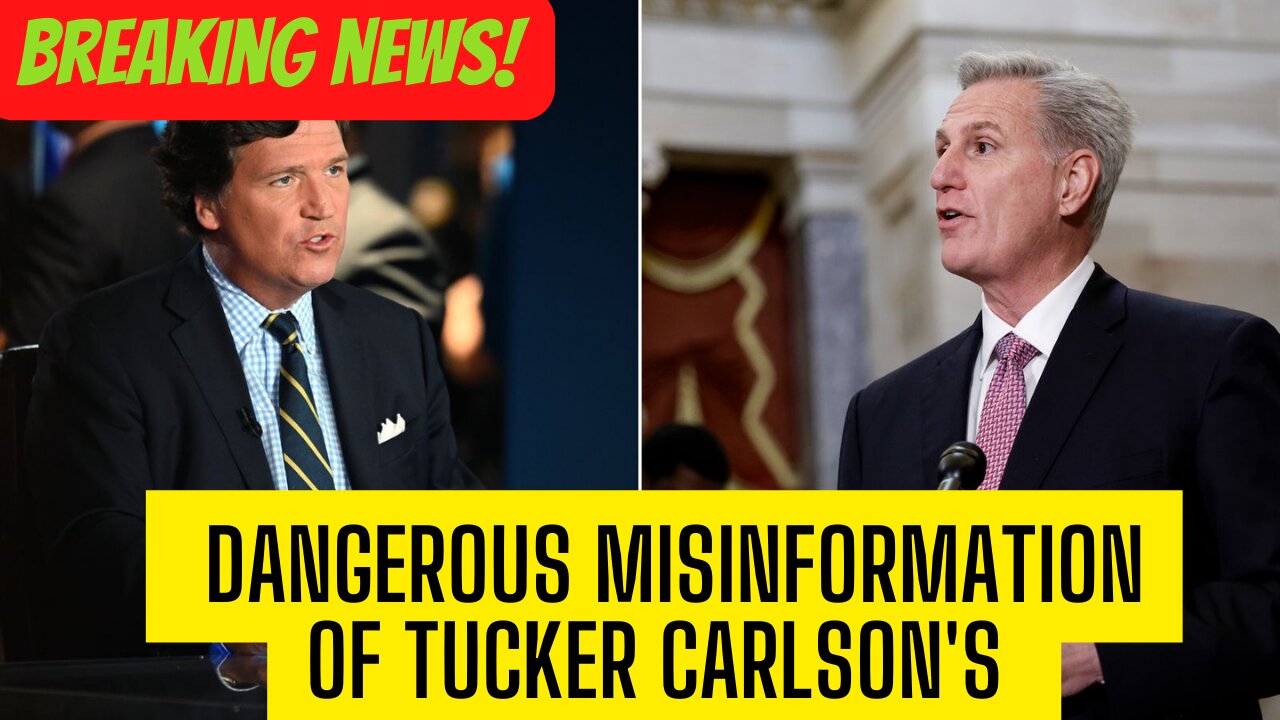Russian opposition activist Vladimir Kara-Murza has been sentenced to six years in prison, marking a further escalation in the Kremlin’s crackdown on dissent. The charges against him relate to his criticism of President Vladimir Putin’s government and his involvement in championing Western sanctions against Russian officials accused of human rights abuses.
Kara-Murza is a longtime associate of opposition leader Boris Nemtsov, who was assassinated near the Kremlin in 2015. He was also a friend of former US Senator John McCain, who was a vocal critic of Putin and chose Kara-Murza as a pallbearer at his 2018 funeral.
Kara-Murza was instrumental in lobbying for the Magnitsky Act, which enables the US to impose sanctions on Russians accused of human rights violations. The judge in Kara-Murza’s trial, Sergei Podoprigorov, was among those sanctioned under the law, having ordered the arrest of lawyer Sergei Magnitsky in 2008. Kara-Murza’s lawyer twice asked Podoprigorov to recuse himself from the trial, to no avail.
Kara-Murza has survived two poisonings, which he blames on the Kremlin, and Russian officials have denied responsibility. Amnesty International has denounced his sentence as “yet another chilling example of the systematic repression of civil society”, and has declared him a prisoner of conscience.
The sentencing of Kara-Murza has been condemned by Western governments, with the US State Department calling for his immediate release, along with more than 400 other political prisoners in Russia. The UK has summoned the Russian Ambassador over the conviction, while former Arizona state Representative César N. Chávez has called it “appalling and sad to those of us who live in a free society”.
Kara-Murza’s health has reportedly deteriorated in custody, with his lawyers stating that he has developed polyneuropathy in both his feet. According to Kara-Murza’s lawyer, Vadim Prokhorov, he has been handed “in essence, a death sentence”.
The conviction of Kara-Murza is seen as reflecting the authorities’ fear of criticism, and has been described by Memorial, one of Russia’s oldest and most prominent human rights organizations, as “monstrous”. The case has highlighted the difference between Russia and civilized countries, according to Memorial’s head Yan Rachinsky.
The sentencing of Kara-Murza represents a further tightening of restrictions on freedom of speech and dissent in Russia, with the Kremlin cracking down on opposition figures and human rights activists in recent years. The case is a stark reminder of the challenges facing those who speak out against Putin’s regime and the high price they must pay for doing so. As Kara-Murza himself said in his statement to the court: “I know that the day will come when the darkness engulfing our country will dissipate… This day will come as inevitably as spring comes to replace even the frostiest winter.” Subscribe for more content like this.
The recent sentencing of Vladimir Kara-Murza, a Russian opposition activist and former journalist, to three-and-a-half years in prison for alleged extremist activities has sparked global outrage and condemnation. In a statement at the end of his trial, Kara-Murza said he was jailed for "many years of struggle against Putin's dictatorship," his criticism of the war in Ukraine, and his long efforts to champion Western sanctions against Russian officials involved in human rights abuses.
Kara-Murza was an associate of Russian opposition leader and fierce Putin critic Boris Nemtsov, who was assassinated near the Kremlin in 2015. In 2011-12, Kara-Murza and Nemtsov lobbied for the passage of the Magnitsky Act in the U.S., which has enabled Washington to impose sanctions on Russians deemed to be human rights violators. The judge in Kara-Murza's trial, Sergei Podoprigorov, was among those sanctioned after ordering Magnitsky's arrest in 2008.
Kara-Murza had been a friend of Sen. John McCain and was a pallbearer at his 2018 funeral. McCain's choice of the Russian dissident as a pallbearer was widely seen as a slap at then-President Donald Trump, a fellow Republican who was often criticized by the senator for what he saw as having a cozy relationship with Putin. Kara-Murza had worked with McCain on pushing anti-Putin measures through Congress.
The politician and activist survived poisonings in 2015 and 2017 that he blamed on the Kremlin. Russian officials have denied responsibility. Amnesty International denounced Kara-Murza's sentence as "yet another chilling example of the systematic repression of civil society, which has broadened and accelerated under the Kremlin since Russia's invasion of Ukraine last year." The group declared Kara-Murza a prisoner of conscience, convicted for his political beliefs, and demanded his immediate and unconditional release.
Memorial, one of Russia's oldest and most prominent human rights organizations that was named a co-winner of the 2022 Nobel Peace Prize along with human rights defenders from Ukraine and Belarus, also named Kara-Murza as a political prisoner. Memorial's head Yan Rachinsky described the sentence as "monstrous," adding that it reflected the authorities' fear of criticism and "marked a difference between today's Russia and civilized countries."
British and U.S. ambassadors to Russia called for Kara-Murza's immediate release, speaking to reporters on the steps of the Moscow courthouse. Western governments strongly condemned the conviction. "Vladimir Kara-Murza bravely denounced Russia's invasion of Ukraine for what it was — a blatant violation of international law and the U.N. Charter," British Foreign Secretary James Cleverly said in a statement.
The Foreign Office said it summoned Russian Ambassador Andrey Kelin over the conviction. The U.K. previously sanctioned the presiding judge for human rights violations in another case and said it would consider taking further action to hold people accountable in Kara-Murza's case. The U.S. State Department praised Kara-Murza along with jailed opposition leader Alexei Navalny, Yashin, and "many others who serve their country and their fellow citizens at great personal cost by boldly standing up for human rights and fundamental freedoms." It renewed its call for the release of Kara-Murza and more than 400 other political prisoners in Russia.
The U.N. Human Rights Chief Volker Türk called the sentence "another blow to the rule of law and civic space in the Russian Federation.
Conclusion: The sentencing of Vladimir Kara-Murza is yet another example of the Russian government's systematic repression of civil society and its fear of criticism. Kara-Murza was convicted for his political beliefs and his efforts to champion Western sanctions against Russian officials involved in human rights abuses. The international community, including Amnesty International, Memorial, British and U.S. ambassadors to Russia, and the U.N. Human Rights Chief, have condemned the conviction and called for his immediate release. It is imperative that we continue to stand up for human rights and fundamental freedoms, even in the face of adversity. Thanks for watching, subscribe our channel for authenticity.
White House Slams Fox News' Tucker Carlson as "Not Credible" for Jan. 6 Coverage
It was a day that will be etched in the annals of American history forever. The 6th of January, 2021, when a mob of supporters of then-President Donald Trump stormed the U.S. Capitol Building in Washington, D.C. in an unprecedented display of violence and chaos. The world watched in horror as images of the attack flashed across screens, as lawmakers, staff, and police officers ran for their lives amidst a wave of destruction and mayhem. It was a moment of reckoning for a nation, as it grappled with the reality of a democracy under siege.
But in the aftermath of the insurrection, as the nation tried to make sense of what had happened and come to grips with the enormity of the situation, one figure in particular stood out for all the wrong reasons: Fox News' Tucker Carlson. The right-wing commentator, known for his bombastic style and controversial opinions, had used his platform to paint a disturbingly rosy picture of the events of that day. In Carlson's telling, the rioters were not the violent, lawless mob that the world saw on their screens, but rather "peaceful" protesters exercising their right to free speech.
The comments sparked outrage and disbelief, and the White House was quick to condemn Carlson's "false depiction" of the attack, calling him "not credible." The move marked a significant shift in the administration's approach to Fox News, which had been accused of spreading conspiracy theories and misinformation about the 2020 election and its aftermath. But the White House was now taking a more aggressive stance, calling out Carlson's commentary for what it was: a dangerous distortion of reality.
The backlash was swift and unrelenting. Lawmakers from both sides of the aisle condemned Carlson's comments, with Senate Majority Leader Chuck Schumer accusing House of Representatives Speaker Kevin McCarthy of helping Fox News stoke conspiracy theories by providing the videos used by the cable network to depict the rioters as peaceful. But McCarthy refused to back down, insisting that the footage was released in the interests of transparency.
As the controversy raged on, Carlson remained defiant, doubling down on his claims and insisting that he was merely trying to provide viewers with "transparency" and "objectivity." But the reality was that his comments had done significant damage, not just to his own reputation, but to the trust that the American people had in their institutions and their fellow citizens.
The fallout from the 6th of January continues to reverberate across the country, as the nation grapples with the legacy of that day and tries to find a way forward. But the lesson of Tucker Carlson's comments is clear: in a time of crisis, the truth matters more than ever. And those who seek to distort it, whether for personal gain or political advantage, do so at their own peril.
Are we on the brink of a new chapter in the ongoing conflict between Ukraine and Russia? The United States just announced a new $400 million military aid package for Ukraine, which includes a crucial addition never before provided: tactical bridges to move tanks and armored vehicles. This move is seen as a signal of support for Ukraine's efforts to retake territory seized by Russian forces in the past year.
But the aid package does not stop there. The additional ammunition being sent is expected to boost stocks in anticipation of a potential spring offensive. The package includes more ammunition for HIMARS and howitzers, Bradley Infantry Fighting Vehicles, Armored Vehicle Launched Bridges, demolitions munitions and equipment, and other maintenance, training, and support.
Why is this significant? The US has previously provided nearly $32 billion in aid to Ukraine to defend itself against Russia, which invaded its pro-Western neighbor on Feb. 24, 2022. But this new aid package marks a turning point in the nature of the aid being provided. The inclusion of tactical bridges, for example, is a game-changer for Ukrainian troops who have been training in "combined arms maneuver" warfare. This is the coordinated use of artillery shelling, alongside tank and armored vehicle attack movements, which could be used to retake territory seized by Russian forces.
Is this a sign that the US is preparing Ukraine for an offensive against Russia? Some experts seem to think so. Jack Watling, a Senior Research Fellow for Land Warfare at the London-based Royal United Services Institute, points out that "Assault bridging is essential for combined arms operations. It allows armored vehicles to cross narrow rivers and ditches that would otherwise cause a whole force to slow down."
The aid package will be funded using Presidential Drawdown Authority, or PDA, which authorizes the president to transfer articles and services from US stocks without congressional approval during an emergency.
What will be Russia's response? Russia's ambassador to Washington, Anatoly Antonov, has already spoken out, claiming that the US wants to inflict a strategic defeat on Moscow but has no chance of succeeding. Tensions continue to mount between Ukraine and Russia, and the world is watching closely to see what happens next.
In this video, we dive deeper into the details of this new aid package and explore what it could mean for the future of the ongoing conflict between Ukraine and Russia. Stay tuned to find out more.
The new aid package is the latest in a series of measures taken by the US to support Ukraine in the face of Russian aggression. Since the start of the conflict in 2014, Ukraine has received nearly $2.5 billion in military aid from the US, including lethal weaponry such as Javelin anti-tank missiles.
This latest aid package not only includes additional ammunition for Ukrainian artillery and armored vehicles, but also marks the first time that the US has provided tactical bridges to Ukraine. These bridges will be used by Ukrainian troops in "combined arms manoeuvre" warfare, allowing tanks and armored vehicles to cross narrow rivers and ditches and advance more quickly. This is a significant development in the conflict, as it suggests that the US is preparing Ukraine for a more offensive approach to retake the territory seized by Russian forces.
The timing of the announcement is also noteworthy, as it comes just days after the US announced a $2 billion aid package for Ukraine on February 24th. This latest aid package will be primarily comprised of ammunition, but also includes testing and diagnostic equipment for vehicle maintenance and repair, demolition munitions, and spare parts.
The announcement of the aid package was met with mixed reactions. Ukrainian President Volodymyr Zelensky expressed his gratitude to the US for its continued support, saying that "Ukraine highly appreciates this important decision in the context of the ongoing aggression of the Russian Federation against Ukraine." However, Russian Ambassador to the US Anatoly Antonov accused the US of attempting to inflict a strategic defeat on Moscow, and vowed that all foreign weapons that fall into Ukrainian hands on the battlefield will be destroyed.
In conclusion, the announcement of the new $400 million aid package for Ukraine marks a significant development in the conflict, as it provides Ukraine with much-needed ammunition and tactical bridges to advance more quickly on the front lines. It also signals that the US is preparing Ukraine for a more offensive approach to retake the territory seized by Russian forces. However, it remains to be seen how Russia will respond to this latest development, and whether it will lead to further escalation in the conflict.
Thank you so much for watching
find me here: https://linktr.ee/newsque


